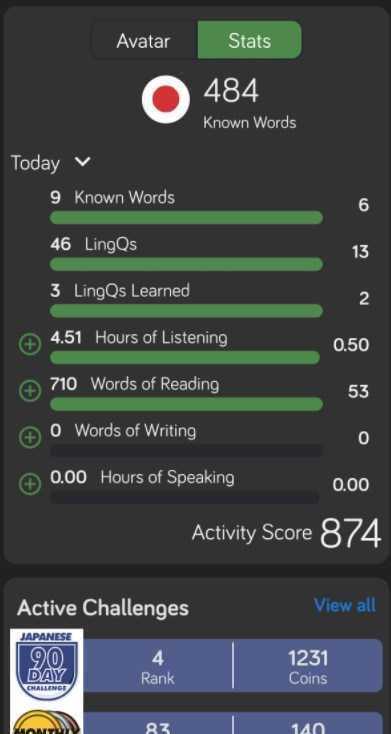This challenge took place from February 2020 to June 2020
I’ve been a fan of Steve Kaufmann for years, and when I was finishing up my 110-Day Kanji Challenge, his platform, LingQ, seemed like the easiest way for me to jump into Japanese immersion since it automatically tokenized words, highlighted the ones you have or have not encountered before, and also has a built-in crowdsourced dictionary feature so I didn’t even have to leave the website to look up words. The way it keeps track of these words is with this thing they call “LingQs”. A LingQ is a connection between you and the word in question. It doesn’t matter whether or not you actually remember the word or anything; if you have encountered it before, it is saved as a LingQ. This is because it assumes that with enough encounters, you will eventually remember it.
Seeing all of this, I took the plunge and bought a year of LingQ premium, which was a little over $100 if I remember correctly. A hefty price considering that I was a junior in college when I bought it. And just like every other college student, I bought it and immediately forgot about it. It was only until 6 months later that I remembered that I had a subscription.
The Plan
So what’s the method for LingQ? It basically boils down to two things: a lot of reading, and a lot of listening. LingQ keeps track of both of them, as long as you are doing it on their platform. LingQ also has a daily streak like most language learning platforms and you can set how many LingQs you need to create per day fulfill the streak for the day.
Steve Kaufmann, in one of his YouTube videos, said that he sets his daily goal to be 100 LingQs. I, however, was a semi-busy college student and modestly kept it at the default goal of 13 LingQs a day. I also kept the other default goals the same: 30 minutes of listening a day and 53 words of reading a day.
The Execution
I initially just read and re-read the LingQ mini-stories that they have, but after a while, it unsurprisingly got really boring. This was when I started to look into the other content that people have posted and also started to post some of my own content as well. I would read the same things over and over again until I could recognize all the words, and would listen to the same things over and over again until I could recite everything from memory. Because the content library was sparse, I had to spend extra time finding something I actually liked and wanted to read and listen to. This ended up being a lot of easy news articles, and also a podcast where the author graciously provided transcripts for.
The Results

Overall, I made 1700 LingQs, read approximately 22000 words, and did 90 hours of listening on the website. Although this sounds impressive, keep in mind that I have no baseline to compare it to. This is the first program I used that actively counts words read, and I don’t know if the amount I’ve read has increased because of it, or if it stayed the same. It also doesn’t count words read if you don’t mark the lesson as ‘finished’, so there have been a lot of times where I come across an extremely long article, only have time to read half of it, and then exit out with no recording of the progress I made.
I didn’t really notice a large difference once I finished; I picked up a few new grammar points, a couple hundred words, and have definitely gotten to the point where reading hiragana is as easy as the English alphabet, but I think the lack of Japanese content on their platform—in part because it’s a paid service and almost all their content is crowdsourced—made it really difficult to find articles that were both comprehensible and compelling to me.
The Conclusion
So here’s my overall opinion on LingQ: I like it, but it has some flaws that eventually made me cancel my membership. Almost all of them are nitpicks, but the annoyance I had over them built up over time.
First, I still don’t really understand how they count LingQs towards the daily goal. A new word that had a LingQ created gets counted, a word marked as known is counted, but moving a LingQ between difficulties may or may not count, I still don’t know. What this means is that one day I might have read a few thousand words, but if none of the words are new or I don’t think I’m comfortable enough to mark them as known, I would still have zero progress towards my daily goal. Because of this, I had to constantly try and find new things to read, which became more annoying than motivating for my learning.
I also had issues with importing articles and word tokenization. When I import an article, a lot of times it doesn’t preserve newlines, which creates a messy experience when I have something with a lot of dialogue. I have to go back in there after their automatic reformatter and manually insert all the newlines after importing.
Speaking of word tokenization, it’s not that great. This problem is mostly because Japanese doesn’t have spaces to separate between words, but LingQ attempts to separate the words so it can parse it correctly so it can keep track of it in your account, but sometimes it would split words in the strangest ways, especially if the article has English letters in it. It’s extra frustrating because they tokenize using spaces, so sometimes I have an article that’s already tokenized with spaces but LingQ will attempt to retokenize it according to their algorithm and mess everything up.
If there’s one thing that LingQ has that makes it extremely useful, it’s their mini-stories. Each one of their 60 mini-stories was written to have a nice learning curve to take someone from a complete beginner to… less of a beginner (60 stories isn’t enough to hit intermediate). Each story is professionally translated and recorded by native people, which makes it an invaluable resource for getting used to the language. If I was learning a new language, I would definitely check LingQ first to see if they have the mini-stories in that language.
The next challenge I did after this was 100 days of deep-dive subs2srs. Check it out now.
